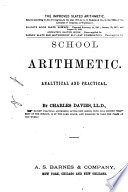 | Charles Davies - 1852 - 344 pages
...multiple. To find the least common multiple of several numbers. I. Place the numbers on the same line, and divide by any prime number that will exactly divide two or more of them, and set down in a line below the quotients and the undivided numbers. II. Then divide as before until... | |
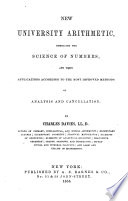 | Charles Davies - Arithmetic - 1856 - 450 pages
...you find the least common multiple of several numbers ' I. Place (he numbers on the same line, and divide by any prime number that will exactly divide two or more of them, and set down in a line below the quotients and the, undivided numbers. II. Then divide as before, until... | |
 | Charles Davies - Arithmetic - 1861 - 496 pages
...the rule for finding the least common multiple. L: Rule. I. Place the numbers on the same line, and divide by any PRIME number that will exactly divide two or more of them, znd set down, in a line below, the quotients and the undivided numbers : II. Then divide as before,... | |
 | Edward Brooks - Arithmetic - 1863 - 350 pages
...product, which is 420, is the LCM Hence the following RULE. — I. Write the numbers beside each other and divide by any prime number that will exactly divide two or more, and write the quotients and undivided numbers beneath. II. Divide these in the same way, and thus continue... | |
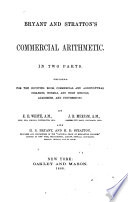 | Emerson Elbridge White, Henry Beadman Bryant - Bookkeeping - 1865 - 344 pages
...factor 3 three times, 2 twice, and 7 once (12=2x2x3). BTILE. Arrange the numbers on a horizontal line, divide by any prime number that will exactly divide two or more of the numbers, and write the quotients and undivided numbers in a line, beneath. Divide this line of... | |
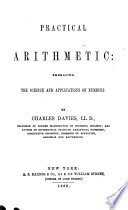 | Charles Davies - Arithmetic - 1866 - 356 pages
...numbers in a line, OPERATION. and then divide them and the quotients 2)6 . 12 . 18 •which follow, by any prime number that ~: ~ ~ will exactly divide two or more of them, J " • • until quotients are found which are prime 123 •with each other. It is plain, that the... | |
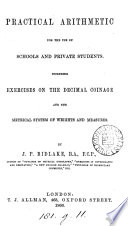 | John Purdue Bidlake - Arithmetic - 1866 - 232 pages
...in a line; strike out any number that is exactly contained in another.* Divide the remaining numbers by any prime number that will exactly divide two or more of them : set down the * For any number that is a measure of another is a measure of all th« multiples of... | |
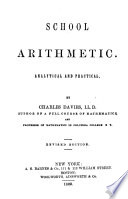 | Charles Davies - Arithmetic - 1869 - 348 pages
...dividend. To find the least common dividend of several numbers, 1. Place the nunJters on the same line, and divide by any prime number that will exactly divide two or more of (fietit and set down in a line below t)ie quotients and the undivided numbers. II. Then divide as before... | |
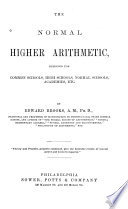 | Edward Brooks - Arithmetic - 1877 - 528 pages
...is 840, is the LCM required. Hence the following Rule. — I. Write the numbers one beside another, divide by any prime number that will exactly divide two or more, and write the quotient* and undivided numbers beneath. II. Divide the quotients in the same manner,... | |
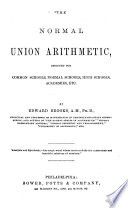 | Edward Brooks - Arithmetic - 1877 - 444 pages
...product, which is 420, is the LCM Hence the following Rule. — I. Write the numbers one beside another, divide by any prime number that will exactly divide two or more, and write the quotients and undivided numbers beneath. II. Divide the quotients in the same manner,... | |
| |